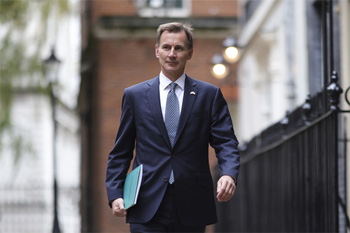The chancellor has abandoned his predecessor’s list of infrastructure schemes slated for acceleration and confirmed that the Government will only build the ‘core’ version of Northern Powerhouse Rail.
In his Autumn Statement, which included forecasts that government borrowing would increase significantly, Jeremy Hunt said the construction of infrastructure such as roads, rail lines and communities would be safeguarded by capital investment of more than £600bn over the next five years.

Mr Hunt with the Autumn Statement document
Mr Hunt told MPs: ‘I can announce that I am not cutting a penny from our capital budgets in the next two years and maintaining them at that level in cash terms for the following three years.
‘This means that although we are not growing our capital budget as planned, it will still increase from £63bn four years ago to £114bn next year and £115bn the year after – and remain at that level.’
Darren Caplan, chief executive of the Railway Industry Association, described the news that capital budgets will not rise as planned after 2024 as ‘concerning’.
The official Treasury document states: ‘The government will seek to accelerate delivery of projects across its infrastructure portfolio, rather than focus on the list of projects that were flagged for acceleration in the Growth Plan.’
This relates to former chancellor Kwasi Kwarteng’s disastrous mini-budget in September, which listed a string of transport and infrastructure projects that the Government intended to prioritise for acceleration, including the A303 Stonehenge Tunnel and East West Rail.
Mr Hunt’s document stated that the Government ‘recommits to the government’s transformative growth plans for our railways [including] East West Rail, core Northern Powerhouse Rail, and High Speed 2 to Manchester’.
The reference to ‘core’ Northern Powerhouse Rail effectively confirmed that the new administration would not build the more expensive version of the cross-pennine rail scheme, despite a pledge from former prime minister Liz Truss to build it ‘in full’.
However, the statement leaves the Government’s commitment to complete the other two major rail schemes unclear. The reference to East West Rail did not commit to build that scheme ‘in full’, leaving doubts over the second and third ‘connection stages’, while the reference to HS2 did not mention the curtailed Eastern Leg, currently slated to continue to the East Midlands.
Despite suggestions that Mr Hunt would use the occasion to move towards road pricing, he announced instead that from April 2025 electric vehicles (EVs) will no longer be exempt from Vehicle Excise Duty.
AA president Edmund King said: ‘Whilst we understand that EVs will need to be taxed, we stress that the road to electrification must not be stalled by excessive taxation.
‘Unfortunately the Chancellor’s EV taxation actions will dim the incentive to switch to electric vehicles.’
The RAC’s head of policy, Nicholas Lyes, said he did not expect the tax change to have much of an effect on dampening the demand for electric vehicles given the many other cost benefits of running one.
He said: ‘After many years of paying no car tax at all, it’s probably fair the Government gets owners of electric vehicles to start contributing to the upkeep of major roads from 2025. While Vehicle Excise Duty rates are unlikely to be a defining reason for vehicle choice, we believe a first year zero-VED rate benefit should have been retained as a partial incentive.’
Register now for full access
Register just once to get unrestricted, real-time coverage of the issues and challenges facing UK transport and highways engineers.
Full website content includes the latest news, exclusive commentary from leading industry figures and detailed topical analysis of the highways, transportation, environment and place-shaping sectors.
Use the link below to register your details for full, free access.
Already a registered? Login